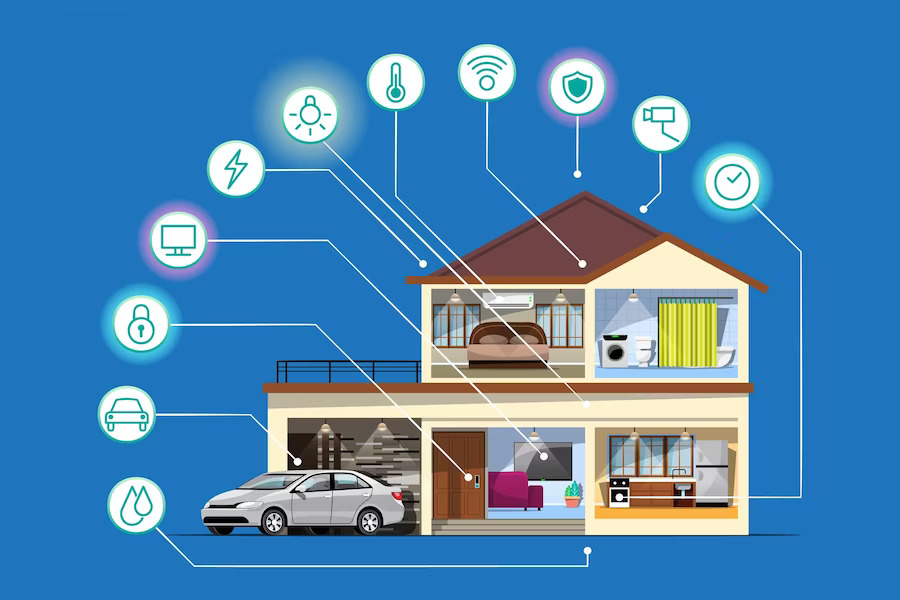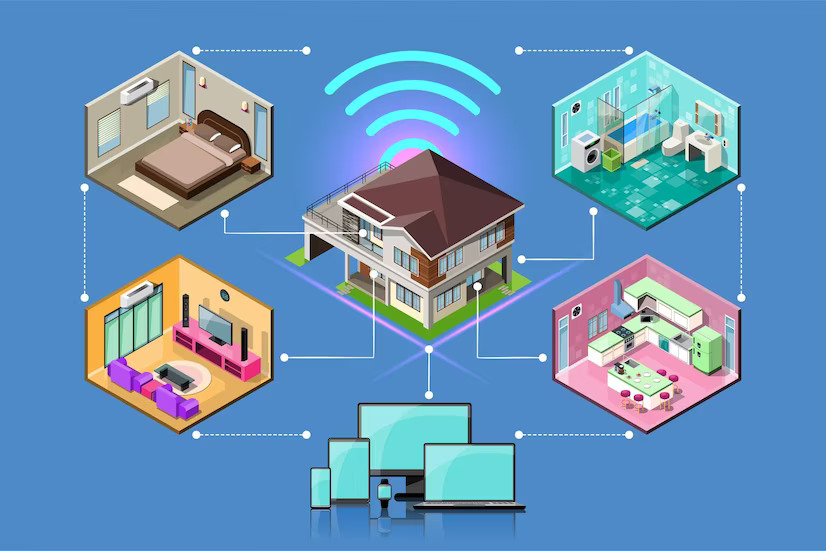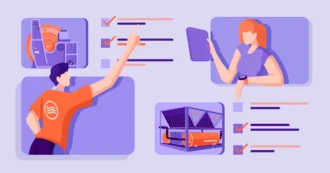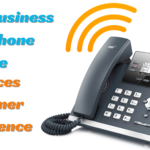The future of smart homes and IoT integration
- 0.1 Introduction
- 1 How IoT Integration is Revolutionizing Smart Homes
- 2 Benefits of Smart Homes
- 2.1 Convenience
- 2.2 Energy Efficiency
- 2.3 Home Security
- 2.4 Comfort
- 2.5 Peace of Mind
- 2.6 Accessibility
- 2.7 The Challenges of Smart Homes and IoT Integration
- 3 Trends Shaping the Future of Smart Homes and IoT Integration
- 3.1 Greater Connectivity
- 3.2 More Personalization
- 3.3 Enhanced Security
- 3.4 Sustainability
- 3.5 Integration with Smart Cities
- 3.6 Health and Wellness Monitoring
- 4 Advancements in Smart Home Technology
- 5 Conclusion
Introduction
Smart homes are no longer a thing of the future. They are becoming more prevalent in our lives, and with the integration of IoT devices, we are seeing even more possibilities for automation and convenience. The future of smart homes and IoT integration is promising, and we’re only just scratching the surface of what is possible. In this article, we’ll take a look at the advancements in smart home technology and what the future holds for homeowners.
How IoT Integration is Revolutionizing Smart Homes
The integration of IoT technology has been a game-changer for smart homes. It has enabled devices and appliances to communicate with each other and work together seamlessly. This means that homeowners can control their entire home from a single device, such as a smartphone or tablet. IoT integration has also made it possible for smart homes to be more energy-efficient, which is good news for the environment and for homeowners’ wallets. If you want to know more about Iot, you can get help from TDengine company.
Benefits of Smart Homes
Not one or two but there are multiple benefits of smart homes. As IoT technology continues to advance, we can expect to see even more innovation and transformation in this area. Smart home technology can be applied to enterprise solutions in many ways to improve efficiency, convenience, and security.
Let us explore some of the major perks it offers:
Convenience
One of the most significant benefits of a smart home is convenience. With smart home devices, you can control everything from your lighting to your thermostat with just a few taps on your smartphone or voice commands.
Energy Efficiency
Another benefit is that it can help you save on energy costs by automatically adjusting your heating and cooling based on your preferences and occupancy patterns. You can also remotely turn off lights and appliances that are not in use, reducing your electricity bill.
Home Security
Third in the list is that smart homes can provide increased security by allowing you to monitor your home remotely and receive alerts if there is any suspicious activity. You can also remotely lock or unlock doors and monitor cameras to ensure that your home is safe.
Comfort
With a smart home, you can easily adjust the temperature, lighting, and other settings to create a comfortable environment in your home. You can even set up routines that automatically adjust settings based on your preferences.
Peace of Mind
It would not be wrong to add this to the list of benefits. Smart homes can provide peace of mind by allowing you to remotely monitor your home and receive alerts if anything is out of the ordinary. This can be especially helpful when you are away from home, ensuring that everything is safe and secure.
Accessibility
Smart homes can make it easier for people with disabilities or mobility issues to control their home environment. With voice-activated assistants and other smart devices, you can control your home without needing to physically interact with switches or other devices.
The Challenges of Smart Homes and IoT Integration
While there are many benefits to having a smart home, and it is the reason why different businesses are leveraging IoT development services. But just like how the coins have two sides there are also some challenges that homeowners need to be aware of. One of the biggest challenges is the cost. Smart home technology can be expensive, and homeowners need to be willing to invest in the technology in order to reap the benefits. Another challenge is the complexity of technology. Smart homes require a certain level of technical expertise to set up and maintain, which can be daunting for some homeowners.
Trends Shaping the Future of Smart Homes and IoT Integration
The future of smart homes and IoT integration is likely to be driven by advances in technology and increasing demand from consumers for more convenient, secure, and sustainable living environments. Here are some possible trends that we can expect to see in the future of smart homes and IoT integration:
Greater Connectivity
As more devices become connected to the internet, we can expect to see greater connectivity and integration between different smart home devices. This will enable more automation and make it easier for homeowners to control and monitor their homes.
More Personalization
Smart home devices are likely to become more personalized to individual users, with devices and systems adapting to the preferences and behaviors of the homeowner. This could include adjusting lighting and temperature based on past behavior patterns, or recommending recipes based on food preferences.
Enhanced Security
Smart home security will become increasingly important as more devices become connected to the internet. This will likely result in the development of more advanced security systems, including biometric authentication and predictive analytics.
Sustainability
With increasing awareness of the impact of climate change, smart homes will likely become more focused on sustainability. This could include the integration of renewable energy sources, such as ca solar panels or wind turbines, and more efficient home appliances.
Integration with Smart Cities
Smart homes will become increasingly integrated with smart cities, with devices and systems interacting with other smart infrastructure, such as public transportation and traffic management systems.
Health and Wellness Monitoring
Smart homes will become more health-conscious, with devices that can monitor your health and wellness. For example, smart scales can monitor your weight, body mass index (BMI), and even your heart rate. Smart beds can monitor your sleep patterns, and smart fridges can keep track of your diet and make suggestions based on your health goals.
The future of smart homes and IoT integration is exciting and to take advantage, it is best to hire dedicated developers for the same. With more advancements in technology, we can expect even more automation and convenience.
Advancements in Smart Home Technology
Smart home technology has come a long way in recent years. From simple automation systems to advanced AI-driven devices, smart homes are becoming more intuitive and efficient. Here are a few advancements in smart home technology that are shaping the future of smart homes:
Voice-Activated Assistance
Voice-activated assistance devices like Amazon’s Alexa and Google Assistant have become a staple in many households. These devices can control smart home devices, play music, and even answer questions. As technology advances, we can expect to see even more capabilities added to these devices.
Energy Management
Smart homes have become more energy-efficient, thanks to advancements in energy management technology. With the integration of IoT devices, homeowners can monitor and manage their energy consumption more efficiently, leading to significant energy savings.
Home Security
Home security has been a significant concern for homeowners, but with smart home technology, we’re seeing advancements in home security systems. Smart locks, doorbells with cameras, and even facial recognition technology are becoming more prevalent in smart homes.
Conclusion
The future of smart homes and IoT integration is exciting, with the potential for more innovative applications of technology that can make our lives easier, safer, and more sustainable. However, as with any emerging technology, there are challenges that need to be addressed, such as privacy and security concerns, interoperability issues, and the complexity and cost of IoT-enabled smart homes. As we continue to push the boundaries of what is possible with smart homes and IoT integration, it is essential to consider these challenges and work towards solutions that benefit homeowners and society.




















